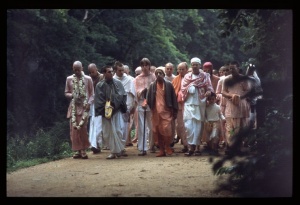SB 9.10.17: Difference between revisions
m (1 revision(s)) |
(Vanibot #0054 edit - transform synonyms into clickable links, which search similar occurrences) |
||
| (One intermediate revision by one other user not shown) | |||
| Line 1: | Line 1: | ||
{{info | {{info | ||
|speaker= | |speaker=Śukadeva Gosvāmī | ||
|listener=King | |listener=King Parīkṣit | ||
}} | }} | ||
[[Category:Srimad-Bhagavatam - Canto 09 Chapter 10]] | |||
[[Category:Bhagavatam Verses Spoken by Sukadeva Gosvami - Vanisource|091017]] | |||
<div style="float:left">'''[[Srimad-Bhagavatam]] - [[SB 9|Ninth Canto]] - [[SB 9.10: The Pastimes of the Supreme Lord, Ramacandra|Chapter 10: The Pastimes of the Supreme Lord, Rāmacandra]]'''</div> | |||
<div style="float:right">[[File:Go-previous.png|link=SB 9.10.16]] '''[[SB 9.10.16]] - [[SB 9.10.18]]''' [[File:Go-next.png|link=SB 9.10.18]]</div> | |||
{{RandomImage}} | |||
==== TEXT 17 ==== | ==== TEXT 17 ==== | ||
<div | <div class="verse"> | ||
sā vānarendra-bala-ruddha-vihāra-koṣṭha- | :sā vānarendra-bala-ruddha-vihāra-koṣṭha- | ||
śrī-dvāra-gopura-sado-valabhī-viṭaṅkā | :śrī-dvāra-gopura-sado-valabhī-viṭaṅkā | ||
nirbhajyamāna-dhiṣaṇa-dhvaja-hema-kumbha- | :nirbhajyamāna-dhiṣaṇa-dhvaja-hema-kumbha- | ||
śṛṅgāṭakā gaja-kulair hradinīva ghūrṇā | :śṛṅgāṭakā gaja-kulair hradinīva ghūrṇā | ||
</div> | </div> | ||
| Line 17: | Line 22: | ||
==== SYNONYMS ==== | ==== SYNONYMS ==== | ||
<div | <div class="synonyms"> | ||
''[//vanipedia.org/wiki/Special:VaniSearch?s=sā&tab=syno_o&ds=1 sā]'' — the place known as Laṅkā; ''[//vanipedia.org/wiki/Special:VaniSearch?s=vānara&tab=syno_o&ds=1 vānara]-[//vanipedia.org/wiki/Special:VaniSearch?s=indra&tab=syno_o&ds=1 indra]'' — of the great chiefs of the monkeys; ''[//vanipedia.org/wiki/Special:VaniSearch?s=bala&tab=syno_o&ds=1 bala]'' — by the strength; ''[//vanipedia.org/wiki/Special:VaniSearch?s=ruddha&tab=syno_o&ds=1 ruddha]'' — stopped, encircled; ''[//vanipedia.org/wiki/Special:VaniSearch?s=vihāra&tab=syno_o&ds=1 vihāra]'' — pleasure houses; ''[//vanipedia.org/wiki/Special:VaniSearch?s=koṣṭha&tab=syno_o&ds=1 koṣṭha]'' — the places where food grains were stocked; ''[//vanipedia.org/wiki/Special:VaniSearch?s=śrī&tab=syno_o&ds=1 śrī]'' — the treasury houses; ''[//vanipedia.org/wiki/Special:VaniSearch?s=dvāra&tab=syno_o&ds=1 dvāra]'' — the doors of palaces; ''[//vanipedia.org/wiki/Special:VaniSearch?s=gopura&tab=syno_o&ds=1 gopura]'' — the gates of the city; ''[//vanipedia.org/wiki/Special:VaniSearch?s=sadaḥ&tab=syno_o&ds=1 sadaḥ]'' — the assembly houses; ''[//vanipedia.org/wiki/Special:VaniSearch?s=valabhī&tab=syno_o&ds=1 valabhī]'' — the frontage of great palaces; ''[//vanipedia.org/wiki/Special:VaniSearch?s=viṭaṅkā&tab=syno_o&ds=1 viṭaṅkā]'' — the rest houses for the pigeons; ''[//vanipedia.org/wiki/Special:VaniSearch?s=nirbhajyamāna&tab=syno_o&ds=1 nirbhajyamāna]'' — in the process of being dismantled; ''[//vanipedia.org/wiki/Special:VaniSearch?s=dhiṣaṇa&tab=syno_o&ds=1 dhiṣaṇa]'' — platforms; ''[//vanipedia.org/wiki/Special:VaniSearch?s=dhvaja&tab=syno_o&ds=1 dhvaja]'' — the flags; ''[//vanipedia.org/wiki/Special:VaniSearch?s=hema&tab=syno_o&ds=1 hema]-[//vanipedia.org/wiki/Special:VaniSearch?s=kumbha&tab=syno_o&ds=1 kumbha]'' — golden waterpots on the domes; ''[//vanipedia.org/wiki/Special:VaniSearch?s=śṛṅgāṭakā&tab=syno_o&ds=1 śṛṅgāṭakā]'' — and the crossroads; ''[//vanipedia.org/wiki/Special:VaniSearch?s=gaja&tab=syno_o&ds=1 gaja]-[//vanipedia.org/wiki/Special:VaniSearch?s=kulaiḥ&tab=syno_o&ds=1 kulaiḥ]'' — by herds of elephants; ''[//vanipedia.org/wiki/Special:VaniSearch?s=hradinī&tab=syno_o&ds=1 hradinī]'' — a river; ''[//vanipedia.org/wiki/Special:VaniSearch?s=iva&tab=syno_o&ds=1 iva]'' — like; ''[//vanipedia.org/wiki/Special:VaniSearch?s=ghūrṇā&tab=syno_o&ds=1 ghūrṇā]'' — agitated. | |||
</div> | </div> | ||
| Line 24: | Line 29: | ||
==== TRANSLATION ==== | ==== TRANSLATION ==== | ||
<div | <div class="translation"> | ||
After entering Laṅkā, the monkey soldiers, led by chiefs like Sugrīva, Nīla and Hanumān, occupied all the sporting houses, granaries, treasuries, palace doorways, city gates, assembly houses, palace frontages and even the resting houses of the pigeons. When the city's crossroads, platforms, flags and golden waterpots on its domes were all destroyed, the entire city of Laṅkā appeared like a river disturbed by a herd of elephants. | After entering Laṅkā, the monkey soldiers, led by chiefs like Sugrīva, Nīla and Hanumān, occupied all the sporting houses, granaries, treasuries, palace doorways, city gates, assembly houses, palace frontages and even the resting houses of the pigeons. When the city's crossroads, platforms, flags and golden waterpots on its domes were all destroyed, the entire city of Laṅkā appeared like a river disturbed by a herd of elephants. | ||
</div> | </div> | ||
__NOTOC__ | |||
<div style="float:right; clear:both;">[[File:Go-previous.png|link=SB 9.10.16]] '''[[SB 9.10.16]] - [[SB 9.10.18]]''' [[File:Go-next.png|link=SB 9.10.18]]</div> | |||
__NOTOC__ | |||
__NOEDITSECTION__ | |||
Latest revision as of 23:39, 18 February 2024

A.C. Bhaktivedanta Swami Prabhupada
TEXT 17
- sā vānarendra-bala-ruddha-vihāra-koṣṭha-
- śrī-dvāra-gopura-sado-valabhī-viṭaṅkā
- nirbhajyamāna-dhiṣaṇa-dhvaja-hema-kumbha-
- śṛṅgāṭakā gaja-kulair hradinīva ghūrṇā
SYNONYMS
sā — the place known as Laṅkā; vānara-indra — of the great chiefs of the monkeys; bala — by the strength; ruddha — stopped, encircled; vihāra — pleasure houses; koṣṭha — the places where food grains were stocked; śrī — the treasury houses; dvāra — the doors of palaces; gopura — the gates of the city; sadaḥ — the assembly houses; valabhī — the frontage of great palaces; viṭaṅkā — the rest houses for the pigeons; nirbhajyamāna — in the process of being dismantled; dhiṣaṇa — platforms; dhvaja — the flags; hema-kumbha — golden waterpots on the domes; śṛṅgāṭakā — and the crossroads; gaja-kulaiḥ — by herds of elephants; hradinī — a river; iva — like; ghūrṇā — agitated.
TRANSLATION
After entering Laṅkā, the monkey soldiers, led by chiefs like Sugrīva, Nīla and Hanumān, occupied all the sporting houses, granaries, treasuries, palace doorways, city gates, assembly houses, palace frontages and even the resting houses of the pigeons. When the city's crossroads, platforms, flags and golden waterpots on its domes were all destroyed, the entire city of Laṅkā appeared like a river disturbed by a herd of elephants.